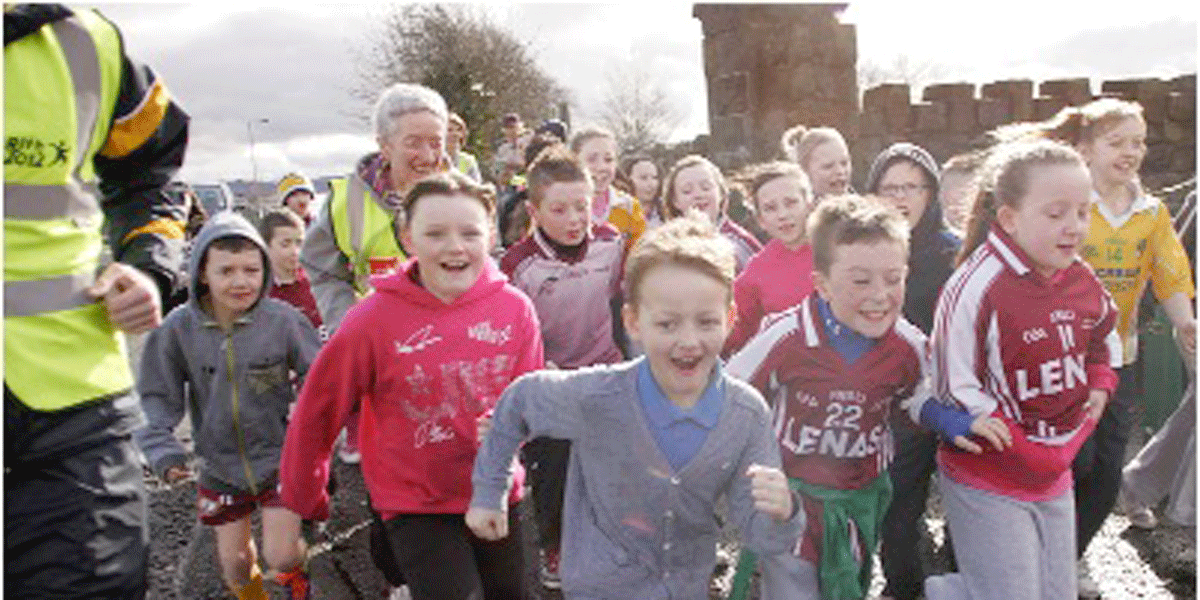Last time I was in Glengormley’s St Enda’s GAC, Seán Fox was on the committee and we were discussing setting up an Irish class for members. That was in 1983. Seán, a solid patriot, was murdered in his home by loyalists in 1993, just months before the ceasefires.
We never did get that Gaeilge class off the ground though I did get to ‘enjoy’ a taxi drive back to West Belfast, over the back of the mountain in the pitch black. Those were tense times; every time the car slowed, I thought I was for the heave-ho.
Today, of course, St Enda’s GAC and Croí Éanna is – by a march – the most enterprising and inspiring Irish language initiative in Belfast with its kindergarten, primary school and burgeoning Irish-speaking community.
I would call that the New Belfast except it’s probably more the New Newtownabbey! At any rate, at 8.45am on a bright but bracing Saturday spring morning, it give me a little holiday in my heart to be with the St Enda Gaels as the flag was raised for the bi-annual RITH 2012.
Fittingly, RITH – a run across Ireland to celebrate the Irish language – is itself the premium event in the Gaeilge calendar. It attracts many thousands of followers and broadcasts a positive message about making space for our national language in 21st-century Ireland.
It’s planned next for 2014 and 2016 which means we won’t go on the run in 2015, the climactic year for Minister Carál Ní Chuilín’s excellent Líofa venture to encourage the learning of Irish. Now that must be a clerical error because we couldn’t have Líofa without RITH.
In fact, let’s have RITH every year, 2013 and 2015 inclusive, Ministers’ budgets permitting.
Recovering from Saturday’s exertions, I dragged myself along to the Holi Festival of Colours, hosted by the city’s Indian population and its chief cultural agency, Arts- Ekta, on Sunday. Highlight of the day was seeing Sammy Douglas, East Belfast DUP MLA, and Lord Mayor Niall Ó Donnghaile plaster each other with powder paints during the colour party. All of which reminds me that you can take the man out of Short Strand and the Newtownards Road but you can’t etc...
Full marks to Nisha Tandon and the gang at ArtsEkta for creating such an exuberant celebration of our diverse city but, my God, isn’t the King’s Hall a grim venue? Surely among all the rebuilding of Belfast, someone will bulldoze this sorry collection of farmer’s sheds, outhouses and Portakabins.
IT’S ALL sweetness and light in City Hall – even if one SDLP councillor told me it was like Stalinist Russia with the DUP and SF brooking no dissent. An unfair description undoubtedly of the new, action-oriented dispensation in City Hall!
But the pebble in the shoe of the new cross-community concord in the Dome of Delight is the sadly sectarian reaction of the unionist minority to the Irish language.
Celebration
All the good work is being undone by City Hall statutes which ban the use of Irish in any Council premises. So no matter if you are hosting a gala celebration for Pobal in St George’s Market for 3,000 punters or bringing the Primary Two class as Gaelscoil na bhFál along to the Falls swimmers for a dip, what the city authorities will not do is allow you to put up a sign in Irish. Even when such a sign, for example ‘Aire!’ (‘Beware!’), might ensure the safety of our children.
Of course, we see the hangover from past attitudes to the Irish language in Council policy relating to Irish language streetnames as well. To add the Irish translation to any street, you have to get over two-thirds of the voters on the register in that street to assent. Anyone who doesn’t respond to the Council survey is regarded as a vote against. Thus, absent voters, holiday voters, forgetful voters or voters who don’t give a toss are all added to the ‘Nay’ side. Only our Belfast unionist brethren, with their vast experience of gerrymandering, could have come up with that one.
We know, of course, how all this will end. The DUP will, sooner rather than later, assent to an Irish Language Act (how can they not when Wales and Scotland both have Acts and when the community wants respect to be the very foundation fo government?). And the Irish language will continue to blossom and take its rightful place as a shared asset of the great city of Belfast.
In the meantime, however, the refusal to recognise the rights of Irish speakers has become the final frontier in the civil rights battle, posing a reputational risk to the hard-earned new image of the Council and acting as a canker to progress.
I’ve never been much of a crystal-ball gazer, but having just run the length of Belfast, from Glengormley to Twinbrook, on RITH 2012 while chatting to the new generation of young Irish speakers who are bringing the language revival to heights we never dreamt of in the eighties, I see protests, acrimony, court cases and, finally, equality, in our future. Wouldn’t it be nice to just fast-forward to the equality bit?





